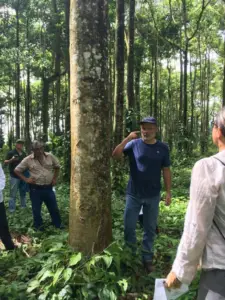The Tecnológico de Costa Rica (TEC), through its School of Forest Engineering, is committed to the conservation and development of forest genetic resources. And one way is with Genfores (GEN = Genetics FORES = Forest), a project that consists of selecting and reproducing exotic and native wood trees that possess superior characteristics for commercial activity.
In addition, it is a university-company linkage model created in 2002, which works permanently between the TEC and national and international forestry companies.
Its purpose is to develop seed production technology, with the highest possible genetic quality, to supply the companies that grow wood in the Latin American region. Currently, Genfores has more than 10 associated forest companies, which are established in Costa Rica, Brazil, Ecuador, and Nicaragua, who provide significant economic resources for scientific-technological development.
This project is led by Dr. Olman Murillo Gamboa, a specialist in Forest Genetic Improvement of the TEC, who over time has formed a permanent group of 5 TEC researchers and 2 associate researchers from the Institute of Forest Research and Services (Insefor) of the National University of Costa Rica (UNA).

Among the objectives of Genfores are:
- Reducing costs, by improving productivity and quality of forest plantations and raw materials of member organizations.
- Reducing the costs of research, training, adaptation, and transfer of reforestation technology through the cooperation of its members.
- Improving academic work through its direct link with the needs of the forest products sector.
- Contributing to the knowledge, rational use, and conservation of the country’s forest genetic resources.
- Contributing to the creation and improvement of the conditions for attracting investments to the forestry sector.
As part of these efforts, the School of Forestry Engineering, through the group of researchers taught at the Central Cartago Technology Campus and the San Carlos Local Technology Campus, the international course on Forest Genetic Improvement.
The training included the participation of reforestation companies from 5 countries: Brazil, Colombia, Nicaragua, Peru, and Costa Rica. Topics such as clonal forestry, population genetics, genetic improvement techniques, and genomics applied to the forest field were addressed.
In addition, international experts from the State University of North Carolina (USA), the Federal University of Viçosa (Brazil), and the Federal University of Mato Grosso (Brazil) participated in the training program.
According to Dr. Murillo, an important part of the mission of any research group is in the transfer of knowledge to society, also mentions that Genfores manages to comply with one of its principles established in its creation, which allows a closer approach with the sector National and regional forestry. And it highlights that the academy – productive sector linkage model created with Genfores has proved to be very successful and of great impact for the national and regional forestry sector.
“Costa Rica has managed to climb in this field of science and places itself at the international forefront in the genetic improvement of teak. The cooperative also progresses rapidly towards the development of the genetic resources of melina and a select group of native species of the high value of its wood”, he concluded.

